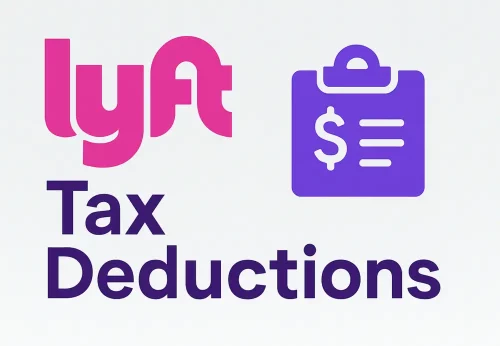Gig Workers on the Road
Home » Gig Driver's Guide » Top Lyft Deductions
Last Updated: October 16, 2025
Lyft driver tax deductions are incredibly important for maximizing your income as a rideshare driver. Understanding which expenses you can deduct, how to track them, and the latest IRS rules is essential for every gig worker. This guide provides you with actionable steps and insights to help you reduce your taxable income.

Table of Contents
About Lyft
Lyft operates a bit differently from other rideshare apps. While most focus purely on ride-hailing services, this rideshare service emphasizes community and provides services like bike and scooter rentals in some markets. However, for tax purposes, your role as a driver is largely the same across platforms: you’re an independent contractor using your personal vehicle to transport passengers.
Top Lyft Driver Tax Deductions
Being a gig rideshare driver means you are an independent contractor, not an employee. This setup carries both responsibilities and significant tax benefits. As a small business owner, you file a Schedule C and are fully responsible for self-employment taxes. The good news is that you can claim a wide range of tax write-offs to lower your taxable income. If an expense is ordinary and necessary for your business, it’s likely deductible.
The table below provides an overview of the most common Lyft driver tax deductions:
Deduction Category |
Description |
Key Considerations |
|---|---|---|
| Vehicle Expenses | The largest deduction for most drivers, covering costs like gas, oil, maintenance, repairs, tires, insurance, and even car payments. |
Two Methods: 1. Standard Mileage Method: Deduct a set rate per business mile. Simpler for most, especially if you drive many business miles. 2. Actual Expense Method: Deduct the actual costs proportionally to business use. Requires meticulous record-keeping of all expenses. |
| Lyft Fees and Commissions | The fees, commissions, and service charges Lyft collects from your fares. | These are direct business expenses. The provided tax summary typically includes this information. |
| Phone Expenses | A portion of your phone bill, phone accessories, and even the cost of your smartphone. | Deduct the business-use percentage of your overall phone expenses. If you use your phone 50% for business, you can deduct 50% of its cost. |
| Passenger Amenities | Items you provide for your passengers, like water, snacks, tissues, phone chargers, or magazines. | Keep receipts for all amenity purchases. |
| Tolls and Parking Fees | Any tolls or parking fees incurred while actively driving for Lyft. | This includes tolls paid during rides and while driving to pick up a passenger. Avoid deducting tickets for traffic violations. |
| Car Washes and Cleaning | The cost of keeping your car clean for passengers. | Both interior and exterior cleaning expenses are deductible. |
| Roadside Assistance | Fees for services like AAA or other roadside assistance programs. | If you use these services for your Lyft vehicle, you can deduct the portion related to business use. |
| Health Insurance Premiums | If you pay for your own health insurance and are not eligible for an employer-sponsored plan. | This deduction is available for self-employed individuals. |
| Home Office Deduction | A portion of your home expenses if you use a dedicated space exclusively and regularly for your business. | Typically applies if you use a specific room for administrative tasks related to your driving business, not just preparing for driving. |
| Qualified Business Income (QBI) | A deduction of up to 20% of your qualified business income. | This deduction, also known as the Section 199A deduction, is available to many self-employed individuals and small businesses. |
Simplifying Mileage Tracking with MileageWise
Keeping up with all these deductions and receipts can feel like a full-time job on its own. This is where tools like MileageWise truly shine, transforming the daunting task of mileage logging and car expense tracking into a simple, automated process. We understand that maximizing your Lyft tax write-off relies heavily on accurate, IRS-compliant records.
Mobile App for Mileage Tracking
- Automatic Mileage Tracking: Detects drives automatically, perfect for busy Lyft shifts.
- Quick Setup: Start logging rides within minutes. No tech headaches.
- Ad-Free & Private: Track miles without ads or sharing sensitive passenger data.
- Reliable Backup Capture: Ensures every trip start and end is saved — even if your phone lags or loses GPS.
- Flexible Distance Calculation: Choose between exact GPS routes or optimized mileage calculations.
- Navigation Integration: Access Waze right from your MileageWise app. Log your trip and navigate instantly.
- Expense Tracking Sync: Combine mileage with car expenses to simplify your tax filing.
Dashboard for a Retroactive Mileage Log
- Google Timeline Import: Recover past Lyft trips from your Google Maps history — ideal if you forgot to track.
- AI Mileage Rebuilder: Automatically reconstructs missed drives and fills in gaps for accurate mileage records.
- IRS Compliance Check: Instantly audits your logs to meet IRS mileage log standards and flags potential audit triggers.
- Bulk Trip Import: Upload ride data or preset common rideshare routes to save time.
- Smart Trip Management: Organize, categorize, and edit multiple trips at once — perfect for busy Lyft drivers fine-tuning their mileage logs.
Lifetime Plan: Pay Once, Track Forever
MileageWise is the only mileage tracker with a one-time payment option. With the Small Lifetime Deal, you can track unlimited miles and create IRS-proof mileage reports for just $119 — no renewals, no hidden fees.
Dedicated Support for Drivers
Our support team gets the challenges of driving for Lyft. Need quick help setting up or generating reports? You’ll get fast, friendly replies — not just automated responses.
Try MileageWise for free for 14 days. No credit card required!
User Testimonial: Finding the Perfect Mileage Tracker
As a full-time Lyft driver, I thought the app’s weekly summaries would be enough to deduct miles from my taxes. But when I started organizing my records, I realized I had no solid mileage log — and it could mean losing hundreds in Lyft tax deductions.
I have already spent hours piecing together my mileage log when a friend in my driver group suggested trying the MileageWise mileage tracker app. It automatically records every drive and generates your mileage log for you.
Now, I can focus on driving instead of worrying about logs. By the time tax season rolls around, I already have an accurate, IRS-ready mileage report — and I’m finally getting every deduction I’ve earned.
Conclusion
Maximizing your Lyft driver tax deductions is not just about avoiding audits; it’s about putting more money back in your pocket. By understanding your options and implementing smart record-keeping habits, you can significantly reduce your taxable income.
Don’t leave money on the table. Turn every business mile into tax savings!
FAQ
Does Lyft track mileage for taxes?
The app only tracks miles during active rides. To claim full Lyft tax deductions, you need a separate mileage tracker to record all business-related driving, including travel to pickups and gas stops.
Should I use the standard mileage rate or actual expenses?
Most Lyft drivers use the standard mileage rate since it’s simpler and often gives a larger deduction. The actual expenses method can work better if your vehicle costs are high, but it requires keeping every receipt next to a mileage log.
What tax forms will I get from Lyft and which do I file?
Lyft sends a Form 1099-NEC (and sometimes a 1099-K) if you earn above certain thresholds. You’ll file these with your Schedule C and Schedule SE when reporting self-employment income.
How long should I keep my receipts and mileage records?
Keep all receipts and logs for at least three years in case of an IRS audit. Digital records from apps like MileageWise make this easy and secure.













